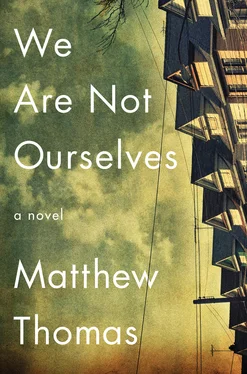“My mother’s bringing someone in,” Connell said nervously. “It’s the best thing for everyone.”
“Your family is good people,” Mr. Corso said with a slight growl in his voice. “You don’t have a clue yet what that means in life, do you?”
Connell looked away. Another silence followed.
“Those guys you debated with. Do they have summer jobs?”
“More like paid internships,” Connell said. “At blue-chip companies.”
“Do you want to work?”
Connell guessed that was why he was sitting across from Mr. Corso, though it wasn’t clear until now that that had been his purpose. “Yeah,” he said, nodding. “I need a job.”
“Can you do real work?”
Mr. Corso drummed his fingers on his desk. The tips were fat, and the nails were neatly trimmed. Another silence followed, in which Connell felt the hair on his arms and bare legs rise in the air-conditioned office.
“Sure.”
“The super of a nearby building on Park called to offer summer relief jobs to our graduating seniors. Doorman, porter.”
He fingered through a pile on his desk and pulled out a piece of paper as if he’d known where it had been all along.
“Does this guy have a son?” Connell asked.
Mr. Corso chuckled. “Poor kid’s only ten. They’re starting the application process early these days.”
Connell tried to hide his embarrassment at being offered this job. “You want me to go break the news to him that you can’t buy your way in here?”
“Better keep that under wraps,” Mr. Corso said, folding the paper into thirds and handing it to Connell in an official manner. “If you do a good job, we should be able to make this a regular tradition for — what — five more summers at least? Maybe beyond if the kid gets in here. We’ll call it the Connell Leary Memorial Fellowship in honor of your deceased athletic career.”
Connell was stationed in the basement, beside one of four service elevators, where he waited for the buzzer to ring and the indicator to light up and tell him his fortune. Gate shut, he shot up to the proper floor, to shuttle nannies to the laundry room and shareholders to the little fiefdoms of their storage cages.
There were some Albanian guys down there with him — college-aged but not in college, or a little older. Connell saw in the snappy way they spoke to Mr. Marku that they had ambitions to make it up to the lobby. Some of them were rough-looking; others, the more recent immigrants, didn’t speak English all that well. He knew he’d have had a better shot at promotion than any of them, if only he trimmed his unruly hair and shaved his scraggly goatee, but he didn’t care. He was just passing through, and he was pretty sure Mr. Marku had taken one look at him and known he’d felt that way.
He was summoned by a gorgeous au pair. While she moved her employers’ sheets to the dryer, he fantasized about going in and seducing her, then stopping the elevator between floors and having sex in it. After he’d returned her upstairs, he stood on the landing imagining the bedrooms on the other side of the door. He went down to the basement and sat in the chair thinking about her, until he rose and headed to the stall in the locker room. Sadik interrupted him, banging on the door, and he didn’t finish.
He put the garbage can in the elevator and went to the top floor to do a run, dumping the contents of their cans into his own. Ancient Mrs. Braverman on the twelfth floor opened her door and handed him a Coke from a mini fridge filled with them. She seemed to remain alive for the sole purpose of bestowing little gifts on the porters. The strange tenement squalor of her digs disconcerted him, the old abandoned furniture, the peeling wallpaper. There was none of the splendor he saw in other apartments, the slabs of stone stretched across kitchen islands as big as docks on a lake. She had kids but they never visited. Money was not a guarantor of dignity.
His presence surprised Mr. Caldecott in 10B when the latter opened his door to toss his garbage bag into the big can. Mr. Caldecott hurried out of there. Connell felt like a Peeping Tom a flashlight had settled on. The feeling wasn’t unfounded: even the proudest of porters from time to time did what Connell had done the previous day, when, once he’d taken it to the basement, he’d gone through the garbage and paper recycling, in search less of salvageable goods than of documentary evidence of the power the shareholders wielded — bank statements, work memos, eye-popping receipts, all the marvelous details of their lives.
In the afternoon, the building settled into a postlunch siesta and he leaned against the painted brick wall next to the service elevator to read Invisible Man . Instead of a brilliant campaign against Monopolated Light & Power, he was stuck with severe stretches of hallway intermittently punctuated by feeble fluorescence. The elevator car contained the only source of incandescent light, a single exposed bulb. For a few minutes he placed the chair directly in the car, but he lost his nerve the first time he heard footfalls down the hall.
Officially, he wasn’t supposed to be reading at all. The activity was tolerated as long as it wasn’t comfortable. And so he stood for hours on the threshold of the elevator and stashed the book when he heard someone approach. Whenever Mr. Marku passed — he was in a generous mood that day, announcing his presence with a stagy, whistled tune — Connell trained his gaze on the light-up panel like a laboratory monkey waiting for an experimenter’s stimulus. One time, though, Connell didn’t lose the book quickly enough. Mr. Marku didn’t give orders or ask questions. He just announced what Connell would do, as though he possessed powers of psychic intuition. “You’ll go outside and sweep the perimeter,” he said. “Then you’ll go to the store and get me a Marlboro Lights hard pack and a six pack of Heineken.” (The first time Mr. Marku told him to buy beer, Connell said he wasn’t old enough, and Mr. Marku replied — accurately, it turned out—“When they see you in that outfit, nobody asks questions.”) “When you’re back you’ll start on those fire stairs.” No one ever used the fire stairs, but Connell had mopped them three times already that week. There were four sets to mop, sixteen flights each. They never gathered any dust.
It was an unusually warm night. The musk of the flowers she’d planted rose up as she walked from the car. Sergei was standing at the back of the house, smoking under a clear, star-filled sky. She greeted him awkwardly, unsure of whether to invite him in, as he could come in on his own when he was finished. It almost seemed he had been waiting for her.
She went upstairs. A while later, his quick, hacking cough announced his presence inside. It was strange to hear a man in the house when her husband was in the bed next to her. Since Sergei arrived, she’d been able to sleep through the night. She wasn’t even bothered by Ed’s nocturnal ravings anymore; she just stayed in bed with a foothold in sleep and let him walk around the room.
She heard Sergei climb the stairs. She lay in bed awake listening to the quiet voices and laugh track from his television, and his own occasional muffled laughter.
It was a mystery what happened in Sergei’s room after he closed the door. She’d gone in when he wasn’t around and found little more than was present when she’d first turned the room over to him. There was the television, the radio, the armchair, and the side table. There was a small stack of Russian volumes in English translation, a Russian-to-English dictionary, a bottle of aftershave, and the suitcase he lived out of. And there was the bed, of course.
Читать дальше
Конец ознакомительного отрывка
Купить книгу












